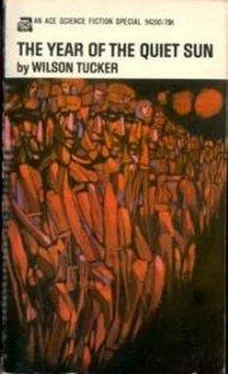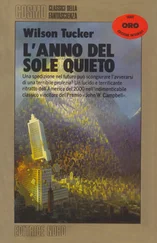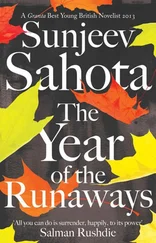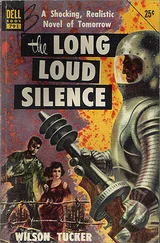Wilson Tucker - The Year of the Quiet Sun
Здесь есть возможность читать онлайн «Wilson Tucker - The Year of the Quiet Sun» весь текст электронной книги совершенно бесплатно (целиком полную версию без сокращений). В некоторых случаях можно слушать аудио, скачать через торрент в формате fb2 и присутствует краткое содержание. Год выпуска: 1970, ISBN: 1970, Издательство: Ace Books, Жанр: Фантастика и фэнтези, на английском языке. Описание произведения, (предисловие) а так же отзывы посетителей доступны на портале библиотеки ЛибКат.
- Название:The Year of the Quiet Sun
- Автор:
- Издательство:Ace Books
- Жанр:
- Год:1970
- ISBN:0-441-94201-6
- Рейтинг книги:3 / 5. Голосов: 1
-
Избранное:Добавить в избранное
- Отзывы:
-
Ваша оценка:
- 60
- 1
- 2
- 3
- 4
- 5
The Year of the Quiet Sun: краткое содержание, описание и аннотация
Предлагаем к чтению аннотацию, описание, краткое содержание или предисловие (зависит от того, что написал сам автор книги «The Year of the Quiet Sun»). Если вы не нашли необходимую информацию о книге — напишите в комментариях, мы постараемся отыскать её.
Won retrospective John W. Campbell Memorial Award in 1976.
Nominated for Nebula Award for Best Novel in 1970.
Nominated for Hugo Award for Best Novel in 1971.
The Year of the Quiet Sun — читать онлайн бесплатно полную книгу (весь текст) целиком
Ниже представлен текст книги, разбитый по страницам. Система сохранения места последней прочитанной страницы, позволяет с удобством читать онлайн бесплатно книгу «The Year of the Quiet Sun», без необходимости каждый раз заново искать на чём Вы остановились. Поставьте закладку, и сможете в любой момент перейти на страницу, на которой закончили чтение.
Интервал:
Закладка:
Tersely: “Why did you do that? Why did you call attention to yourself?”
“Because I was lonely! Because I was sick and hurt at sight of an empty world! I yelled out because those people were the only living things I’d found here, other than a frightened rabbit. I wanted their company, I wanted their news! I would have given them everything I owned for only an hour of their time. Katrina, I wanted to know if people were still living in this world.” He stopped and took tighter rein on his emotions. More quietly: “I wanted to talk to them, to ask questions, but they were afraid of me — scared witless, shocked by sight of me. They ran like that frightened rabbit and I never saw them again. I can’t tell you how much that hurt me.”
She pulled her hands from his and dropped them into her lap.
“Katrina—”
She wouldn’t look up at once, but steadfastly kept her gaze on the tabletop. The movement of her hands had left small trails in the dust. He thought the tiny bundle of her seemed more wilted and withdrawn than before: the taut skin on her face appeared to have aged in the last few minutes — or perhaps that age had been claiming her all the while they talked.
“Katrina, please.”
After a long while she said: “I am sorry, Brian. I will apologize for my children, and for that family. They dared not trust you, none of them, and the poor family felt they had good reason to fear you.” Her head came up and he felt shock. “Everyone fears you; no one will trust you since the rebellion. I am the only one here who does not fear a black man.”
He was hurt again, not by her words but because she was crying. It was painful to watch her cry.
Brian Chaney came into the briefing room a second time. He was carrying another lantern, two plastic cups, and a container of water from the stores. He would have brought along a bottle of whiskey if that had been available, but it was likely that the Commander had long ago consumed the whiskey on his successive birthdays.
The old woman had wiped her eyes dry.
Chaney filled both cups and set the first one on the table before her. “Drink up — we’ll drink a toast.”
“To what, Brian?”
“To what? Do we need an excuse?” He swung his arm in an expansive gesture which took in the room. “To that damned clock up there: knocking off sixty-one seconds while my ears suffered. To that red telephone: I never used it to call the President and tell him he was a dunce. To us: a demographer from the Indiana Corporation, and a research supervisor from the Bureau of Standards — the last two misfits sitting at the end of the world. We’re out of place and out of time, Katrina: they don’t need demographers and researchers here — they don’t have corporations and bureaus here. Drink to us.”
“Brian, you are a clown.”
“Oh, yes.” He sat down and looked at her closely in the lantern light. “Yes, I am that. And I think you are almost smiling again. Please smile for me.”
Katrina smiled: pale shadow of an old smile.
Chaney said: “Now that is why I still love you!” He lifted his cup. “To the most beautiful researcher in the world — and you may drink to the most frustrated demographer in the world. Bottoms up!” Chaney emptied the cup, and thought the water tasted flat — stale.
She nodded over the rim of her cup and sipped.
Chaney stared at the long table, the darkened lights overhead, the stopped clock, the dead telephones. “I’m supposed to be working — making a survey.”
“It doesn’t matter.”
“Have to keep Seabrooke happy. I can report a family out there: at least one family alive and living in peace. I suppose there are more — there has to be more. Do you know of anyone else? Anyone at all?”
Patiently: “There were a few at first, those many years ago; we managed to keep in touch with some survivors by radio before the power failure. Arthur located a small group in Virginia, a military group living underground in an Army command post; and later he contacted a family in Maine. Sometimes we would make brief contact with one or two individuals in the west, in the mountain states, but it was always poor news. Each of them survived for the same reasons: by a series of lucky circumstances, or by their skills and their wits, or because they were unusually well protected as we were. Their numbers were always small and it was always discouraging news.”
“But some survived. That’s important, Katrina. How long have you been alone on the station?”
“Since the rebellion, since the Major’s year.”
Chaney gestured. “That could be—” He peered at her, guessing at her age. “That could be thirty years ago.”
“Perhaps.”
“But what happened to the other people here?”
She said: “Almost all the military personnel were withdrawn at the beginning; they were posted to overseas duty. The few who remained did not survive the attack when the rebels overran the station. A very few civilian technicians stayed with us for a time, but then left to rejoin their families — or search for their families. The laboratory was already empty in Arthur’s year. We had been ordered underground for the duration.”
“The duration. How long was that?”
The sharp old eyes studied him. “I would think it is ending just now, Brian. Your description of the family outside the fence suggests it is ending now.”
Bitterly: “And nobody around but you and me to sign the peace treaty and pose for the cameras. Seabrooke?”
“Mr. Seabrooke was relieved of his post, dismissed, shortly after the three launches. I believe he returned to the Dakotas. The President had blamed him for the failure of the survey, and he was made the scapegoat.”
Chaney struck the table with a fist.
“I said that man was a dunce — just one more in a long line of idiots and dunces inhabiting the White House! Katrina, I don’t understand how this country has managed to survive with so many incompetent fools at the top.”
Softly-spoken reminder: “It hasn’t, Brian.”
He muttered under his breath and glared at the dust on the table. Aloud: “Excuse me.”
She nodded easily but said nothing.
A memory prodded him. “What happened to the JCS, to those men who tried to take Camp David?”
She closed her eyes for a moment, as if to close off the past. Her expression was bitter. “The Joint Chiefs of Staff were executed before a firing squad, a public spectacle. The President had declared a business moratorium on the day of the execution; government offices closed and the children were let out of school, all to witness the spectacle on the networks. He was determined to give the country a warning. It was ghastly, depressing, and I hated him for it.”
Chaney stared at her. “And I have to go back and tell him what he’s going to do. What a hell of a chore this survey is!” He hurled the drinking cup across the room, unable to stifle the angry impulse. “Katrina, I wish you had never found me on the beach. I wish I had walked away from you, or thrown you into the sea, or kidnapped you and ran away to Israel — anything.”
She smiled again, perhaps at the memory of the beach. “But that would have accomplished nothing, Brian. The Arab Federation overran Israel and drove the people into the sea. We wouldn’t have escaped anything.”
He uttered a single word and then had to apologize again, although the woman didn’t understand the epithet. “The Major certainly jumped into the beginning of hell.”
She corrected him. “The Major jumped into the end of it; the wars had been underway for nearly twenty years and the nation was on the brink of disaster. Major Moresby came forward only in time to witness the end for us, for the United States. After him, the government ceased to be. After twenty years we were wholly exhausted, used up, and could not defend ourselves against anyone.”
Читать дальшеИнтервал:
Закладка:
Похожие книги на «The Year of the Quiet Sun»
Представляем Вашему вниманию похожие книги на «The Year of the Quiet Sun» списком для выбора. Мы отобрали схожую по названию и смыслу литературу в надежде предоставить читателям больше вариантов отыскать новые, интересные, ещё непрочитанные произведения.
Обсуждение, отзывы о книге «The Year of the Quiet Sun» и просто собственные мнения читателей. Оставьте ваши комментарии, напишите, что Вы думаете о произведении, его смысле или главных героях. Укажите что конкретно понравилось, а что нет, и почему Вы так считаете.












